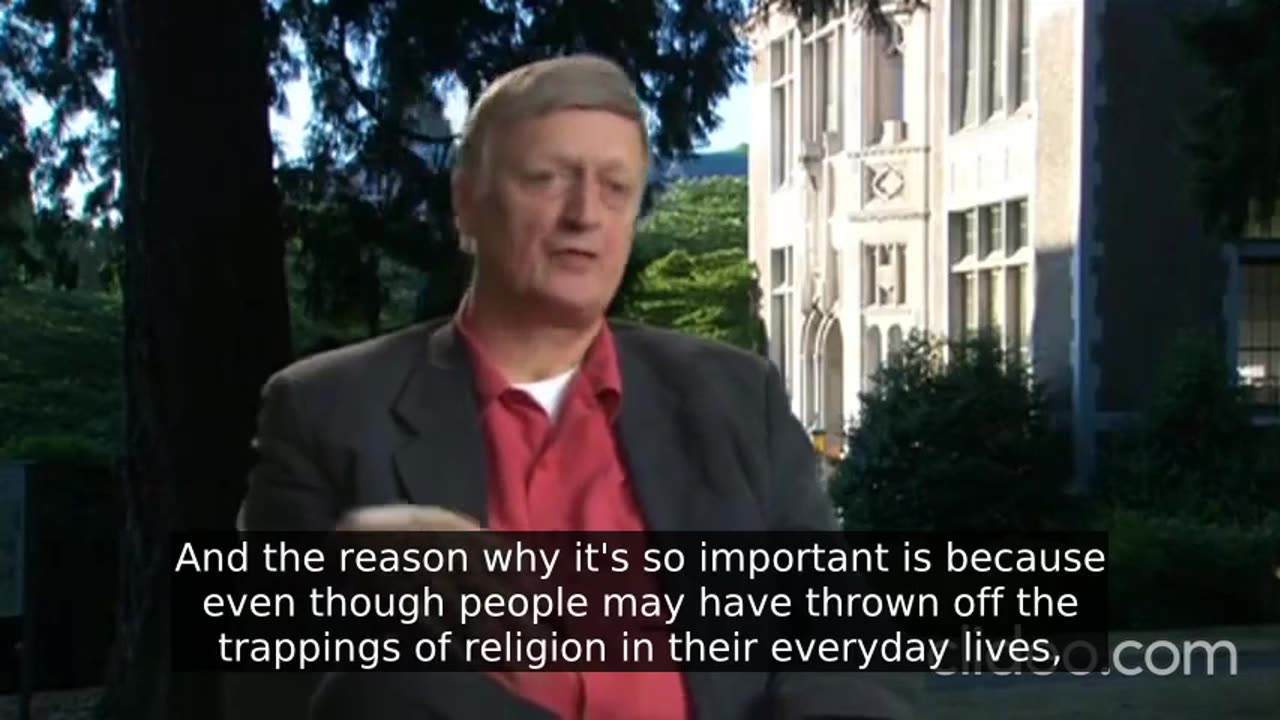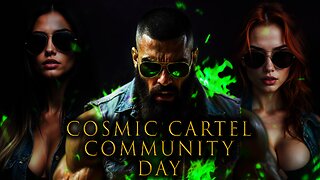Premium Only Content

MICEAL LEDWITH, PH.D ON GOD, SCIENCE & RELIGION - WHAT THE BLEEP DO WE KNOW?!
So what are the specifics you think about the message of science and the advanced sciences of people that have reinvigorated people? I think the main thing is that if I wanted to reduce it to a nutshell here, I'd say it's giving back power. Because after all, we're not here searching for something to make sense of my life so that I can live an orderly and reasonably harmonious life without becoming a drug addict or a sex maniac or some other form of escapism. I just don't want to be able to cope with life so that I can go through it in a reasonably harmonious way. I want something more than that. And I often think of Woody Allen's great statement when he said, I don't want to achieve immortality through my works, I want to achieve immortality through not dying. But let's get real here. I mean, we're not here about coping. We're here about assailing some of the most sacred bastions in human history that were ever placed there. In other words, can I dictate the kind of life that I'm going to experience? Can I avoid becoming a helpless pawn at the hands of powerful and manipulative people? Am I just a cog in a wheel, or is there something more to life? Am I going to be able to escape falling prey to sickness and disease, or perhaps even death itself? I mean, it seems to me, looking at the great sources that we all have, that we were never meant to die. Never meant to die. And now, of course, it's an absolutely taboo subject. You know, you're dismissed as a completely unrealistic fool if you even suggest some of these things. So that's why I think the movie has awakened in the hearts of many people, not just a coping mechanism so that we can go to the grave more recollected and serene, but far more than that, that we can now take control of our lives. So that's why I say, I think the movie is about power. So along the same lines, why is it so important, because as you know, in this film, we addressed through you, addressing some of the, what we thought were the misconceptions about God, and we addressed religion, and actually to some extent we addressed religion now. Why is it so important to do that? People have said, it's a long question, you know, people have said, well, you didn't have to be so mean about religion, you didn't have to be so mean about all that. Why is it so important to address that before talking about some of these concepts, which are probably more involved? I think the religion was not addressed in the movie, it was mentioned in the movie. And I think the movie was an essential prelude to dealing with religion, but religion has not been dealt with yet. And the reason why it's so important is because, even though people may have thrown off the trappings of religion in their everyday lives, they may even say they're atheist or agnostic, nevertheless, in the very culture we've grown up in, you know, we have absorbed the religious mentality and the religious framework, which I call the Hamburger universe. They have absorbed that. So even, you know, if we think of a religious person as someone who goes to the temple, or a synagogue on Friday night, or the mosque on Saturday, or church on Sunday morning, that's not what a religious person is. That's a practising religious person. But a religious person is what almost everybody in the Western world is, because they're living within a framework, within a matrix that has been totally moulded by ways of thinking about the relationship of God to the world that have nothing to do with reality. So, why is it necessary to talk about religion even to an agnostic audience? Because the agnostic audience is totally a religious hook, line and sinker, and the problem is only exacerbated by the fact that they're not aware of it. So, if we need to address the issues about religion, it's not whether I go to mass on Sundays that's the issue, or the synagogue. It is, what way do I think about the world? What meaning has my life? What should I do? I mean, am I supposed to be here looking at a list of commandments? 517 in the Jewish faith, or 700 and something in the Muslim faith, or 10 in the Christian faith? Am I here to obey those so that I can get tagged on to the end of my life as some sort of reward? Some sort of optional extra that I can exchange, you know, in the international currency exchange as I pass through the gates of heaven? Is that why I'm here? Of course it's not. But can we ever transcend into that other different way of looking at reality without addressing the roots of the problem? You cannot. And the roots of the problem in all people are religious today. So, you're saying that even though somebody has abandoned and walked away from their religion, that the effects are still with them? Absolutely. And they don't even know it, which is even worse. I mean, I had an incident once in Australia some years ago. And I was, you know, I was talking about the heaven and hell idea, you know, that grandpa had asked me to talk about. And this young man of 20 years of age or so said to me, you know, that was really interesting, but thank God, he said, I'm, thank God, I am not religious, he said. I said, is that so? And he said, yeah, I'm not religious. My parents had no belief and I grew up without any beliefs at all. And he had told me the previous day that his father had died when he was eight years old. So I said, do you mind me asking, where did they tell you your father went when he died? He said, well, they told me he went to heaven. I said, that sounds suspiciously like a religious view to me. And I went down through the 20 things or so, you know, belief in right or wrong, retribution for good and bad deeds, etc. And on every single one of them, he passed with flying colours as a person with a profoundly religious outlook on reality. He was never in a church in his life, synagogue or mosque, but a perfect religious person. The idea of God being outside somehow, the idea of that the universe happens to us, the idea of the sky and the cloud, where does that come from? Where do our current ideas of God and where the power resides in the universe, where do those ideas come from? There are tantalising hints in some of our most sacred texts, even within, they say, the Jewish, Islamic and Christian faiths, because those faiths essentially are all the same. They come from Abraham and they're tied to the Western religious traditions. But there are tantalising hints in those texts even about a race of beings, mysterious and so forth, called the Elohim, called the Nephilim. And if you only investigate slightly, you'll find that there's an awful lot more to these aliens. There's an awful lot more to these ancient texts than we've given them credit for. So I'm not going to go into that here now because it's impossible in this short space of time, and it would only do more damage than good. But what I am saying is that all of this stuff, the ways in which we think of God, which is basically an enlarged human being up there in the skies, who has given commandments and was scrutinising us from above, all of that has come from our history. It's not essential in our nature, it has come from historical conditioning, which is far more ancient, I think, than the present, acceptable, politically correct understanding of the origins of the human race can give it credit for. And I think if that understanding of our history were known, it would put into utter irrelevance, by comparison, all those dated and outmoded debates between the creationists and evolutionists. Because the truth isn't there, the truth is much farther back behind each of those. But that's a big day's work. So if you're asking where does our tendency to think of God as a human being enlarged, with basically the same virtues and the same faults and failings as human beings, where does it come from? It comes from our history. It's not inbuilt in our nature. And the only way out of that is to have a better understanding of our real history. That's a big job. What does it mean when we say God is within? Usually, when we say God is within, it means very little, because it's just one other container into which he has been stuffed. I mean, we've given up thinking of God as up there, and the Australians thinking of him as down there, and others thinking of him over on the right or the left. We've given up that crude idea. God is the visitor from outer space who comes in to do miracles and to perform gracious acts on my behalf. But the buzzword, of course, is now that God is within. Jesus used it. I mean, it's as old as the foundations of the world, this idea. But I think the important point to understand is when we say that God is within, that we are not speaking of ourselves as a container within which God is enclosed. And I always think of that old image of the alien movies with the creature bursting out of your chest. You know, God is not like that within us. He's not encased within us. When we say the kingdom of heaven is within you, as Jesus put it, rather than God is within you, then we're talking about a complete identification of our being with the divine source that's at the origin of it all. I don't like using the word God, and I do not like using the word spirit. Why? Not that I'm against God, which would be a rather defeatist attitude. Someone asked Abraham Lincoln one time, in the Civil War, he said to the President, God is on our side. And Lincoln said, I'm not sure whether he is or not, sir, but I sure as heck hope that we are on his side. So when we're talking about God, you know, we're thinking of him as a person, as a human being. And that's why, until you get past that, you can't really discuss anything about God with anybody. In my opinion, the word God, because of its associations with that superhuman human who's up there with the beard, the clouds, and the book of life, and the computer, and the laser of our science, he is what I think of when someone tells me you are God. And I know I'm not sitting on a cloud with a long beard. Therefore, I find it hard to absorb this fact. Round this teaching, where he uses the word point zero, I find is much better. Because to my mind, the word God is beyond rehabilitation. And so is the word spirit. It has become burdened with so much irrelevant and erroneous baggage from the past that we'd be much better served to drop the word and use another term that does not have that history tied to it. In the film, you said something to the effect of, you know, we're far too hung up on morality and good and bad. And I know a lot of people have said, well, what does that mean? Do you abandon any sense of being righteous or virtuous, you know, any of those ideas? So why is it important, then, to abandon an idea of morality in order to have a more of all respect? Well, I haven't had the advantage of seeing the movie fifty times like some people here have, unfortunately. That's nothing to do with anyone's fault except my own. Right and wrong. Does that mean that it's a free for all? Absolutely not. I mean, the problem that I have with right and wrong in those categories is not that I want a free for all, but that right and wrong doesn't go nearly far enough. I also have a problem with words like miracle. I mean, is levitation a miracle? Is walking on water a miracle? Is the multiplication of reality in your hand a miracle? Or is becoming invisible a miracle? N-O is the answer. They are not miracles. They are simply a veil of higher forms of physics which we do not yet know. In certain religions, if you levitate, you can become canonized. Of course, the catch is that you've got to die first. However, they never canonize anyone until they're safely dead in case they kick over the traces subsequently. But I am not against right and wrong in itself. I'm simply saying that, like the word miracle, it's too poverty-stricken a term to capture the grandeur of what's actually involved. Because a miracle suggests something that has been bestowed from above by a benign God who's pleased with your progress. So you get a reward. You levitate because God's pleased with you. You levitate, scientifically, because you have exerted a torsion field which runs counter to gravity. And if it's strong enough, it'll allow you to float. There's nothing mysterious or miraculous about it. It's far more wonderful than any miracle. Likewise, with right and wrong, you know, they don't go far enough. Because all that says is that I am guiding my life by a set of rules given from above by this creature, God. Because he is a creature on a cloud. So what am I replacing that with? I'm replacing it with a far more enlightened understanding. By which we might guide human behaviour. Which is far more exacting and demanding than a system of right and wrong could ever be. Because what am I saying is that there are actions that evolve me, and there are actions that regress me. In other words, if you just use Newtonian physics to every action, there is an equal and opposite reaction. So if I do something, I know in the structure of the universe that I'm in, that the effects of that are going to come back to me. And that I must one day, whenever it is, sooner or later, I must deal with it. So that's what I want to suggest as a criterion for behaviour. Not this cruel right and wrong, obeying rules of some superintending deity in the clouds with a lazy satellite system to see the number plates on your car. No. I want you to understand that in the whole course of evolution that we're involved here. Advancing into it with the use of quantum insights into nature. That everything I do, I must answer for. It's all going to come back to me. And therefore I have to be very, very careful what I do. Far more careful than right and wrong. Because as you know, the whole system of right and wrong has just been construed as a barrier to protect me from God making too many demands. I've done what was asked of me. Tick, tick, tick. Don't ask any more. Now if we're seriously interested in human evolution, we're not interested in some sort of insurance policy to protect us against God's demands. Which is what right and wrong is. We're interested in what can I do to bring out the powers that are in me. Because I said to you at the start of this interview, what are we about here in this world? Thought theories to help me to live in a more balanced way with God. Adversity and so forth. So that I go to my grave, you know, a recollected person. No, we're interested here in power. And it's not about, you know, soulful ideas of love and good will towards all things. We're interested in power. Because if I have power to dictate the circumstances of my life. To dictate that I am no longer the, you know, the toy of powerful and manipulative people. Then a lot of the issues that have plagued humanity, which come basically from fear and unworthiness. Which as I said to you are historical in human history. Then all those will fall away. So the seat of evolution is the acquisition of power. And that is where the whole relevance of these seven planes come in as I explained earlier on. In the film, Rontha says, you know, how can you sin against God? What do you think he means by how can you sin against God? Well, I think you have to take that in the context that he said, you know, if we take this analogy of his, that point zero self-reflected. And that produced what you and I are today, spirit, for want of a better term. And we badly need a better term. Well, that's me up there. I have incarnated in seven different planes a multitude of times. And my soul has recorded those adventures. But my only direction when I left that point was to explore the unknown. For anything that I can do here is an exploration of the unknown. So there is no sin in terms of what I do. We will eventually learn that there are certain things if we do them that we are infringing what I said earlier, the action-reaction thing. And we've got to learn that. But there's nobody keeping records up there. The records are here. And I'm going to have to deal with them. There's nothing more painful than a record-keeping God up in the skies. So I think anyone who's setting out on the path of enlightenment will be absolutely impeccable in everything that they do. Is it because of fear of damnation? No. Or of the punishment of God? Or because I have sinned and haven't got forgiveness? No, no, no. I mean, these are all excuses that keeps us away from the real problem. The really enlightened person will see every action has a reaction with which I must deal. And if I'm wise, I'm not going to do stuff that will cause me to have to face it and resolve it and balance it in my soul later. That's the real criterion. So you cannot sin against God because there is no sin against God. So how can we perform that action? Because the divine presence is in us all. And we are fulfilling the divine mandate in everything that we do. We will find out quickly enough. So the action-reaction reality that there are some things that do not fault me. And we'll have to learn that sooner or later. But can you sin against God? That's impossible. And it implies an idea of God and God's will for us that belongs to the hamburger universe. It doesn't belong to reality.
-
 LIVE
LIVE
Spartan
2 hours agoSpartan - Pro Halo Player for OMiT | Scrims vs Tenrai then ranked (probably)
465 watching -
 22:09
22:09
MYLUNCHBREAK CHANNEL PAGE
8 hours agoThe 5 Eyes Are Watching You - Pt 1
11K19 -
 LIVE
LIVE
sophiesnazz
2 hours ago $1.22 earnedTIME TO WIND PEOPLE UP !socials
152 watching -
 LIVE
LIVE
OhHiMark1776
3 hours ago🟢07-26-25 ||||| Halo Multiplayer Rumble: No. 16 ||||| Halo MCC (2019)
46 watching -
 LIVE
LIVE
GamerGril
3 hours agoThe E-Gril Within | First Time Play Through | Saturday Spookfest
170 watching -
 18:22
18:22
Liz Wheeler
3 hours agoWhat Ghislaine Maxwell Knows
5.97K12 -
 LIVE
LIVE
cosmicvandenim
6 hours agoWARZONE - Kenetik Energy Announcement - Discord Spy Bots
95 watching -
 1:05:51
1:05:51
Jeff Ahern
3 hours ago $16.99 earnedThe Saturday Show with Jeff Ahern
93.6K12 -
 LIVE
LIVE
Misfit Electronic Gaming
1 hour ago"LIVE" RUMBLE HALO Spartans "Halo MCC" 23 Followers to go till we hit !000 RUMBLE TAKEOVER
11 watching -
 1:57:13
1:57:13
Film Threat
5 hours agoLIVE FROM SAN DIEGO COMIC-CON! (Saturday) | Film Threat Live
12.6K